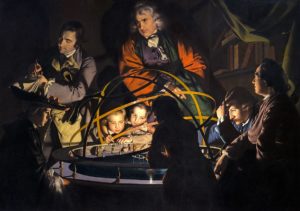 Daily Life In Rome
Daily Life In Rome
Daily life in Rome, as it was for the Greeks, was family-centered, usually involving extended families. Even their names carried the model: A Roman’s first name was as we use it: Mark, Susan Robert, etc. The second name was that of the clan… of the largest and oldest family group. Their third name was of the smaller and more direct branch of the family.
Also as in Greece, slavery was common, and again, was seen as an economic necessity. In the earlier years, and in cities, slaves were generally treated fairly well, occasionally very well. Later, and especially on huge farms and in mines, they were treated horribly.
A central part of Roman life was a huge and informal system called patronage.
Patronage was a web of personal relationships. It ran from the highest officials and richest men, all the way down to the commoners. A rich man, for example, might notice a young tradesman who was honest and intelligent, and might offer to take him on as a client. The young man, if he agreed (and he didn’t have to), would find the friends of his patron (the rich, older man) coming to him for projects. He’d also get help from his patron if he ended up in any sort of legal trouble, or to find a good husband for his daughter, a better house, and so on. And it would reflect very poorly on a patron if he allowed one of his clients to become destitute.
In return, the young tradesman (the client), would show up at his patron’s home each morning (at least when he was in town), discuss the patron’s plans and problems, and do whatever he could to help. If his patron was seeking a political office, for example, he’d get everyone he knew to support that cause. A client was also expected to ransom his patron, should he be held for ransom following a foreign battle. (Which was common in the old days.)
Patronage could also run between a general and his troops, between the founder of a city and its inhabitants, and in other ways. All of these relationships followed ancient customs and had legal standing. A patron was required by law to deal with his client in good faith, and a client was required to be loyal.
And these were not isolated arrangements, a patron might also be the client of someone else and so on. The patron who helped you out of a legal dispute (by calling in a favor from the judge or a close friend of the judge), might also be asked by a senator to repair an aqueduct, in turn requiring you to work out of town, at no charge, for several weeks.
The richest patrons were expected to build and maintain public buildings, as well as putting on public games, like gladiatorial contests. In return, they received immensely valuable favors from senators and emperors. (Government contracts, prime pieces of recently-conquered land, and so on.)
There were an unlimited number of trades, favors and deals that went on via patronage, again from the top to the bottom. These innumerable and interlocking relationships created great stability among the Romans, which held firm over centuries.
This arrangement kept the highest classes in control of Roman power, of course. For example, in the hundred year period between 233 BC and 133 BC, just the top ten families in Rome provided half the consuls. (A consul was a chief magistrate of the Roman republic; the highest of officials.) More than three quarters of the consuls came from the top 26 families. Patronage, however, kept this from becoming a major problem: Clients benefited from their patron having powerful influence.
The Roman civilization was primarily an urban civilization: a confederation of cities. The city of Rome was the first, of course, but other cities were added continually: slowly at first in Italy (which took centuries) and then very rapidly from one end of the Mediterranean to the other.
But when Rome conquered a city, they didn’t loot and burn it as the Greeks and others tended to. There were exceptions, of course, but Rome would rather absorb than destroy. And they would offer the people of that city various types of citizenship (there were many, and you could sometimes move from one to another), generally keeping the old rulers in place as middle management.
More than that, Rome didn’t place immense burdens on its cities. So long as your city provided a certain number of soldiers and/or paid what by today’s standards would be a minimal level of taxes… if you didn’t make trouble or threaten its power… Rome would leave you alone, and perhaps do your city some favors.
All of this made life in Roman cities more reliable and more pleasant than life in Greek cities, and considerably less dangerous: Roman cities did not fight one another… were not permitted to fight one another.
All together, this became a new form of organization.
Check out our back issues. I promise you they are unique.
